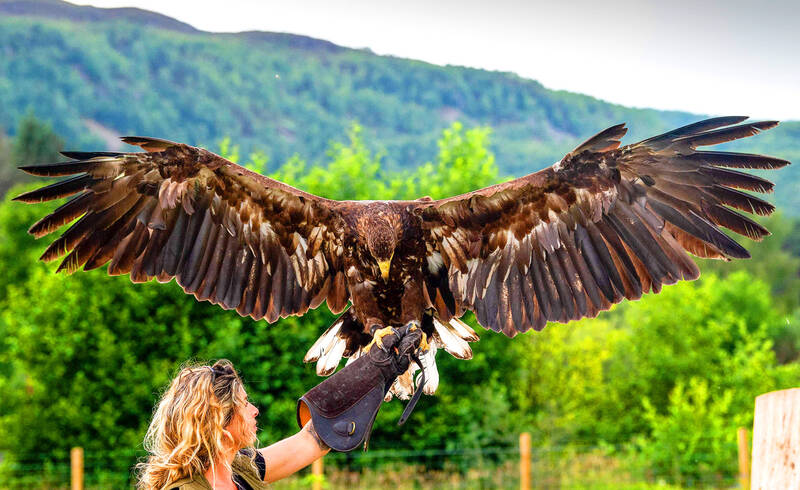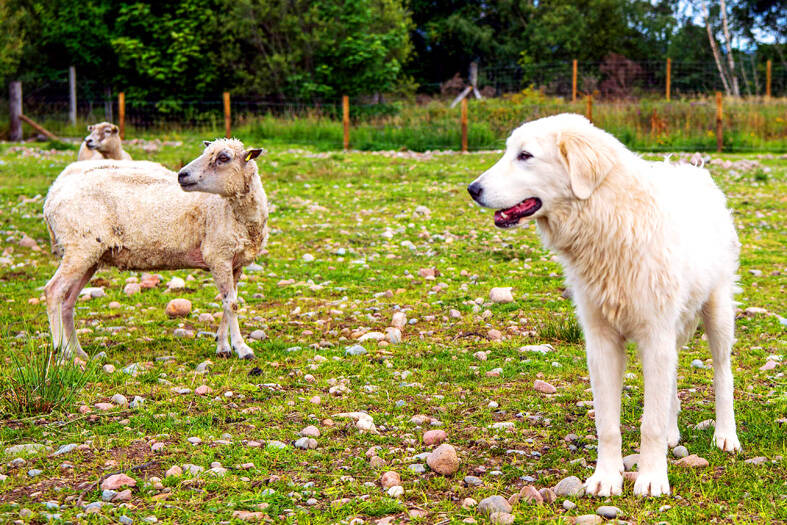Dotted among a small flock of sheep in a field in the Scottish Highlands, Luigi and Peaches, two young working dogs with thick white coats, are busy being trained to keep watch on the skies above.
The pair, who descend from the Roman-era Maremma breed reared by shepherds to protect their livestock from wolves, are learning to guard against Scotland’s resurgent sea eagles, formally known as white-tailed eagles.
Once driven to extinction across the British Isles, they have been reintroduced over the past few decades, but are increasingly blamed for ravaging lambs left to roam the countryside.

Photo: AFP
The loss of the valuable livestock is causing tensions with some farmers devastated by the financial fallout and demanding that the government issue licenses to shoot the birds. The worsening situation prompted Jonny and Daisy Ames to create the dog training program at their falconry near Aviemore, in the hope it will allow farmers and eagles to better coexist.
“The last thing that we want is to see eagles being shot, for licenses to be issued and to end up back at square one,” Daisy Ames said. “There needs to be a solution that works for both sides.”
Sea eagles were once a common sight across Scotland, but were hunted almost to extinction throughout the 19th century, with the last bird shot in 1918. A reintroduction program in 1975 brought chicks from Norway to the island of Rum, one of Scotland’s wildest places. More were reintroduced in Wester Ross between 1993 and 1998, and on the east coast in 2007 and 2012.

Photo: AFP
The birds, an endangered species with only about 10,000 pairs across the globe, have since established a breeding population on Scotland’s west coast and are now thriving — but at a cost to some farmers.
Searching for a solution, Jonny Ames tapped into his experiences working with the Cheetah Conservation Project in Namibia, where Maremmas were trained to keep the big cats away from livestock.
To teach his latest canine recruits, he attaches a lure designed to resemble an eagle to a drone and hovers it over the dogs in a sheep field.
“The drone has a big eagle hanging on the bottom of it and it kind of dive bombs the dogs a little bit,” he said. “If you can imagine an eagle in the wild, if it’s coming in to a kill and there’s a wolf there, it isn’t going to land.”
The program also involves keeping a sea eagle at the falconry to feed from a carcass in front of the dogs in a controlled environment.
“They can’t reach each other, but we want to try and show the dogs that the eagle is a predator and if there is one near the lambs then you want to scare it off,” Jonny Ames said.
One of the benefits of the dogs is that they are “completely soft” when it comes to humans, he said. “They don’t make good guard dogs for people and the worst they are going to do is lick them to death.”
Jenny Love, a sheep farmer on Scotland’s west coast, said the eagles have had a devastating effect, adding that she frequently hears complaints from local farmers.
However, she is sympathetic to the UK’s biggest bird of prey, with a majestic wingspan stretching over 2m.
“Eagles are not the bad guys here,” Love said. “There is nothing else for these birds to eat, so they are eating lambs which are easy prey for them, but this is taking an enormous toll on farmers. Their livelihood is being taken away from them. The public perception is that farmers are the bad guys.”
Farmers are eligible for a maximum annual payout of £5,000 (US$6,374) for livestock killed, through the Sea Eagle Management Scheme.
However, the process is costly and arduous, and only partially recoups the losses, Love said.
She believes compensation levels should be increased and application requirements simplified.
One farmer had lost£30,000 worth of lambs in a season, she said.
“I’ve had big tough guys breaking down in tears in front of me because they don’t know what to do,” she said.
Love is skeptical about the Maremmas, which she said are trained to work in fields where the sheep are close together.
Thousands of dogs would be needed to guard sheep across the mountains, where nearly all the lambs are lost to the birds, Love said.

Packed crowds in India celebrating their cricket team’s victory ended in a deadly stampede on Wednesday, with 11 mainly young fans crushed to death, the local state’s chief minister said. Joyous cricket fans had come out to celebrate and welcome home their heroes, Royal Challengers Bengaluru, after they beat Punjab Kings in a roller-coaster Indian Premier League (IPL) cricket final on Tuesday night. However, the euphoria of the vast crowds in the southern tech city of Bengaluru ended in disaster, with Indian Prime Minister Narendra calling it “absolutely heartrending.” Karnataka Chief Minister Siddaramaiah said most of the deceased are young, with 11 dead

DENIAL: Musk said that the ‘New York Times was lying their ass off,’ after it reported he used so much drugs that he developed bladder problems Elon Musk on Saturday denied a report that he used ketamine and other drugs extensively last year on the US presidential campaign trail. The New York Times on Friday reported that the billionaire adviser to US President Donald Trump used so much ketamine, a powerful anesthetic, that he developed bladder problems. The newspaper said the world’s richest person also took ecstasy and mushrooms, and traveled with a pill box last year, adding that it was not known whether Musk also took drugs while heading the so-called US Department of Government Efficiency (DOGE) after Trump took power in January. In a

By 2027, Denmark would relocate its foreign convicts to a prison in Kosovo under a 200-million-euro (US$228.6 million) agreement that has raised concerns among non-governmental organizations (NGOs) and residents, but which could serve as a model for the rest of the EU. The agreement, reached in 2022 and ratified by Kosovar lawmakers last year, provides for the reception of up to 300 foreign prisoners sentenced in Denmark. They must not have been convicted of terrorism or war crimes, or have a mental condition or terminal disease. Once their sentence is completed in Kosovan, they would be deported to their home country. In

LOST CONTACT: The mission carried payloads from Japan, the US and Taiwan’s National Central University, including a deep space radiation probe, ispace said Japanese company ispace said its uncrewed moon lander likely crashed onto the moon’s surface during its lunar touchdown attempt yesterday, marking another failure two years after its unsuccessful inaugural mission. Tokyo-based ispace had hoped to join US firms Intuitive Machines and Firefly Aerospace as companies that have accomplished commercial landings amid a global race for the moon, which includes state-run missions from China and India. A successful mission would have made ispace the first company outside the US to achieve a moon landing. Resilience, ispace’s second lunar lander, could not decelerate fast enough as it approached the moon, and the company has